ELCC1002 - Ethics in Early Learning and Child Care Programs
VerifiedAdded on 2023/05/27
|6
|1156
|492
Essay
AI Summary
This essay delves into the code of ethics for early childhood educators, emphasizing key principles such as promoting student health and well-being, utilizing developmentally appropriate practices, and demonstrating care in all aspects of their work. It highlights the importance of partnerships with parents and colleagues to support families and enhance human dignity. The essay further underscores the necessity for educators to continuously pursue knowledge and maintain integrity in their professional relationships. Referencing organizations like AECEA and resources from Childcarecanada.org, it provides a comprehensive overview of the ethical responsibilities and practices essential for early childhood educators to create a nurturing and effective learning environment.
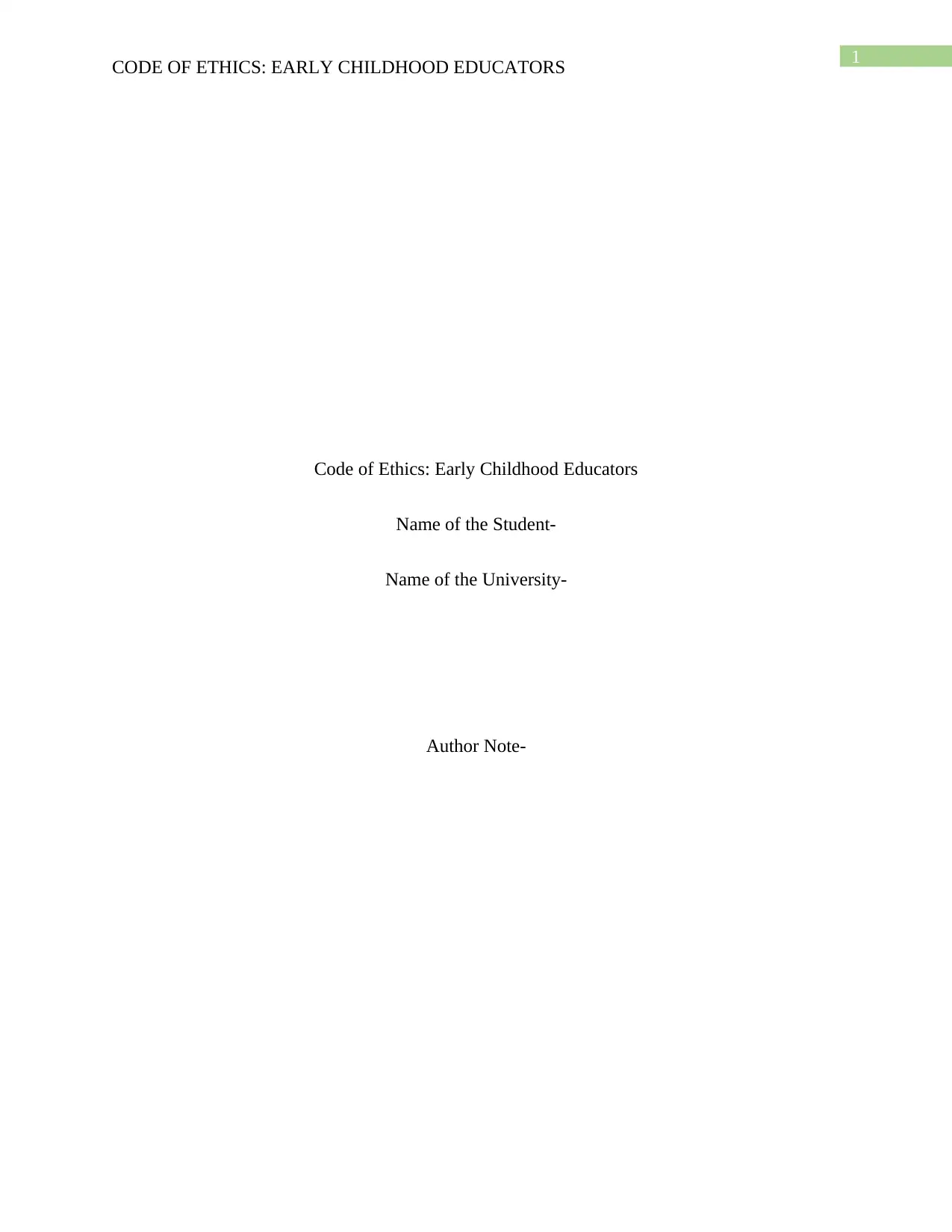
1
CODE OF ETHICS: EARLY CHILDHOOD EDUCATORS
Code of Ethics: Early Childhood Educators
Name of the Student-
Name of the University-
Author Note-
CODE OF ETHICS: EARLY CHILDHOOD EDUCATORS
Code of Ethics: Early Childhood Educators
Name of the Student-
Name of the University-
Author Note-
Paraphrase This Document
Need a fresh take? Get an instant paraphrase of this document with our AI Paraphraser
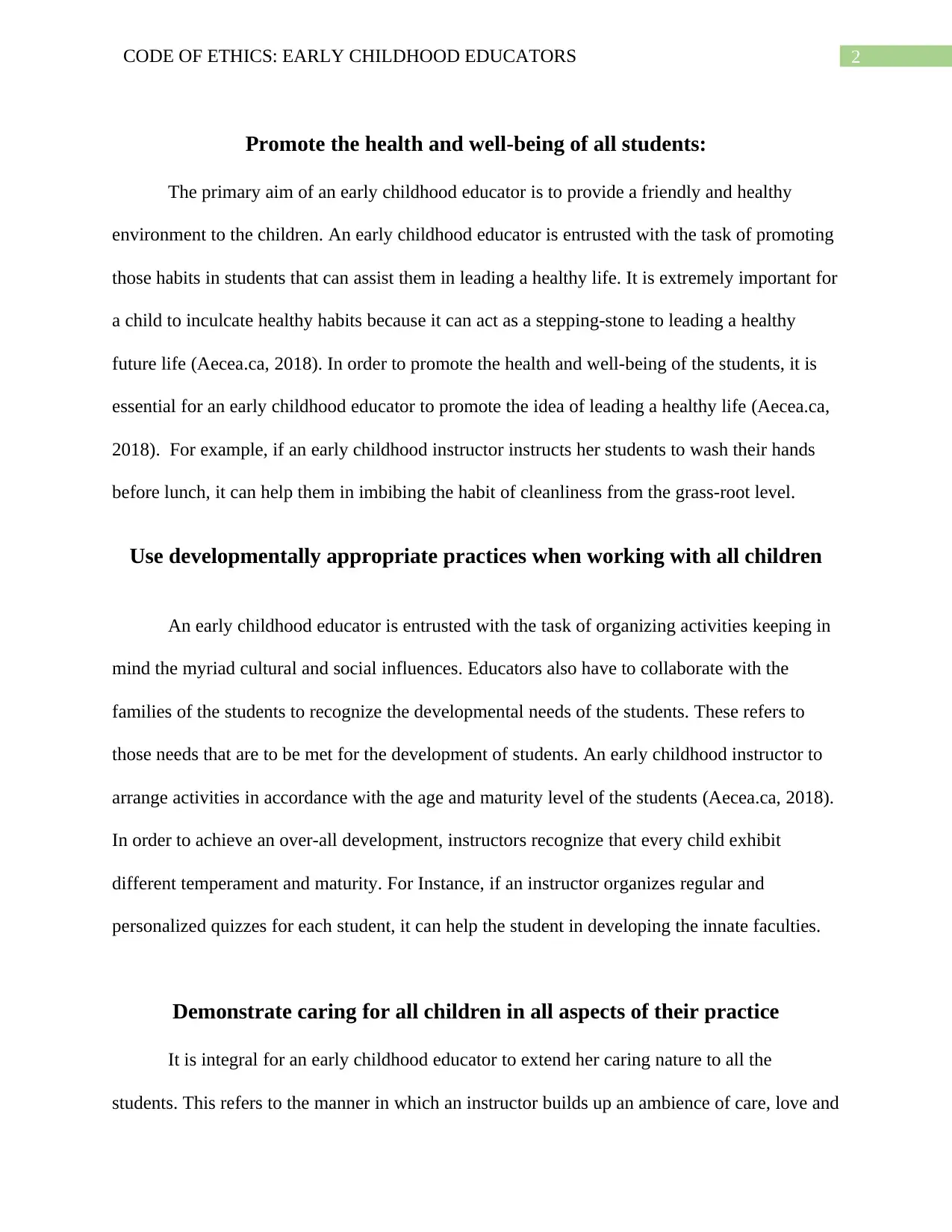
2CODE OF ETHICS: EARLY CHILDHOOD EDUCATORS
Promote the health and well-being of all students:
The primary aim of an early childhood educator is to provide a friendly and healthy
environment to the children. An early childhood educator is entrusted with the task of promoting
those habits in students that can assist them in leading a healthy life. It is extremely important for
a child to inculcate healthy habits because it can act as a stepping-stone to leading a healthy
future life (Aecea.ca, 2018). In order to promote the health and well-being of the students, it is
essential for an early childhood educator to promote the idea of leading a healthy life (Aecea.ca,
2018). For example, if an early childhood instructor instructs her students to wash their hands
before lunch, it can help them in imbibing the habit of cleanliness from the grass-root level.
Use developmentally appropriate practices when working with all children
An early childhood educator is entrusted with the task of organizing activities keeping in
mind the myriad cultural and social influences. Educators also have to collaborate with the
families of the students to recognize the developmental needs of the students. These refers to
those needs that are to be met for the development of students. An early childhood instructor to
arrange activities in accordance with the age and maturity level of the students (Aecea.ca, 2018).
In order to achieve an over-all development, instructors recognize that every child exhibit
different temperament and maturity. For Instance, if an instructor organizes regular and
personalized quizzes for each student, it can help the student in developing the innate faculties.
Demonstrate caring for all children in all aspects of their practice
It is integral for an early childhood educator to extend her caring nature to all the
students. This refers to the manner in which an instructor builds up an ambience of care, love and
Promote the health and well-being of all students:
The primary aim of an early childhood educator is to provide a friendly and healthy
environment to the children. An early childhood educator is entrusted with the task of promoting
those habits in students that can assist them in leading a healthy life. It is extremely important for
a child to inculcate healthy habits because it can act as a stepping-stone to leading a healthy
future life (Aecea.ca, 2018). In order to promote the health and well-being of the students, it is
essential for an early childhood educator to promote the idea of leading a healthy life (Aecea.ca,
2018). For example, if an early childhood instructor instructs her students to wash their hands
before lunch, it can help them in imbibing the habit of cleanliness from the grass-root level.
Use developmentally appropriate practices when working with all children
An early childhood educator is entrusted with the task of organizing activities keeping in
mind the myriad cultural and social influences. Educators also have to collaborate with the
families of the students to recognize the developmental needs of the students. These refers to
those needs that are to be met for the development of students. An early childhood instructor to
arrange activities in accordance with the age and maturity level of the students (Aecea.ca, 2018).
In order to achieve an over-all development, instructors recognize that every child exhibit
different temperament and maturity. For Instance, if an instructor organizes regular and
personalized quizzes for each student, it can help the student in developing the innate faculties.
Demonstrate caring for all children in all aspects of their practice
It is integral for an early childhood educator to extend her caring nature to all the
students. This refers to the manner in which an instructor builds up an ambience of care, love and
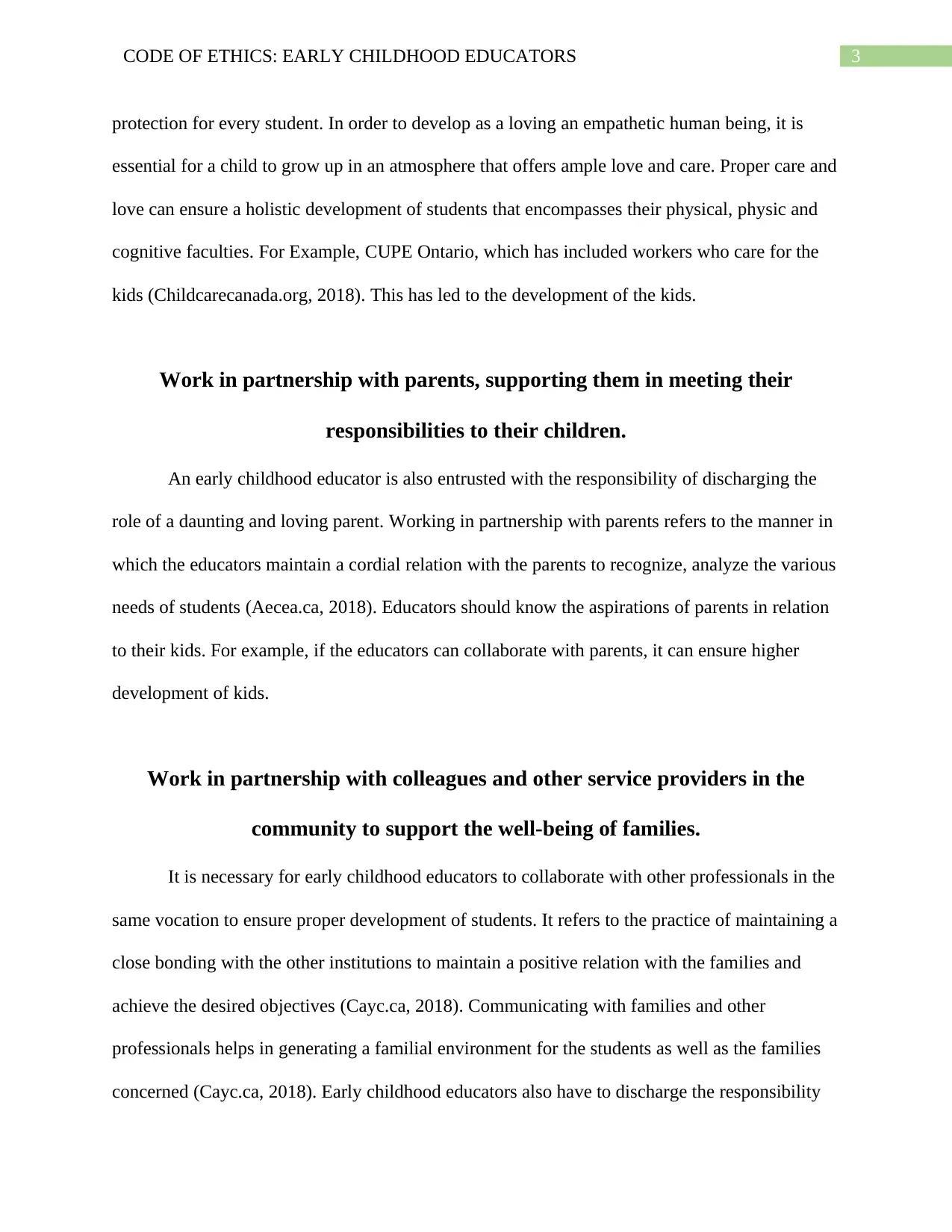
3CODE OF ETHICS: EARLY CHILDHOOD EDUCATORS
protection for every student. In order to develop as a loving an empathetic human being, it is
essential for a child to grow up in an atmosphere that offers ample love and care. Proper care and
love can ensure a holistic development of students that encompasses their physical, physic and
cognitive faculties. For Example, CUPE Ontario, which has included workers who care for the
kids (Childcarecanada.org, 2018). This has led to the development of the kids.
Work in partnership with parents, supporting them in meeting their
responsibilities to their children.
An early childhood educator is also entrusted with the responsibility of discharging the
role of a daunting and loving parent. Working in partnership with parents refers to the manner in
which the educators maintain a cordial relation with the parents to recognize, analyze the various
needs of students (Aecea.ca, 2018). Educators should know the aspirations of parents in relation
to their kids. For example, if the educators can collaborate with parents, it can ensure higher
development of kids.
Work in partnership with colleagues and other service providers in the
community to support the well-being of families.
It is necessary for early childhood educators to collaborate with other professionals in the
same vocation to ensure proper development of students. It refers to the practice of maintaining a
close bonding with the other institutions to maintain a positive relation with the families and
achieve the desired objectives (Cayc.ca, 2018). Communicating with families and other
professionals helps in generating a familial environment for the students as well as the families
concerned (Cayc.ca, 2018). Early childhood educators also have to discharge the responsibility
protection for every student. In order to develop as a loving an empathetic human being, it is
essential for a child to grow up in an atmosphere that offers ample love and care. Proper care and
love can ensure a holistic development of students that encompasses their physical, physic and
cognitive faculties. For Example, CUPE Ontario, which has included workers who care for the
kids (Childcarecanada.org, 2018). This has led to the development of the kids.
Work in partnership with parents, supporting them in meeting their
responsibilities to their children.
An early childhood educator is also entrusted with the responsibility of discharging the
role of a daunting and loving parent. Working in partnership with parents refers to the manner in
which the educators maintain a cordial relation with the parents to recognize, analyze the various
needs of students (Aecea.ca, 2018). Educators should know the aspirations of parents in relation
to their kids. For example, if the educators can collaborate with parents, it can ensure higher
development of kids.
Work in partnership with colleagues and other service providers in the
community to support the well-being of families.
It is necessary for early childhood educators to collaborate with other professionals in the
same vocation to ensure proper development of students. It refers to the practice of maintaining a
close bonding with the other institutions to maintain a positive relation with the families and
achieve the desired objectives (Cayc.ca, 2018). Communicating with families and other
professionals helps in generating a familial environment for the students as well as the families
concerned (Cayc.ca, 2018). Early childhood educators also have to discharge the responsibility
⊘ This is a preview!⊘
Do you want full access?
Subscribe today to unlock all pages.

Trusted by 1+ million students worldwide
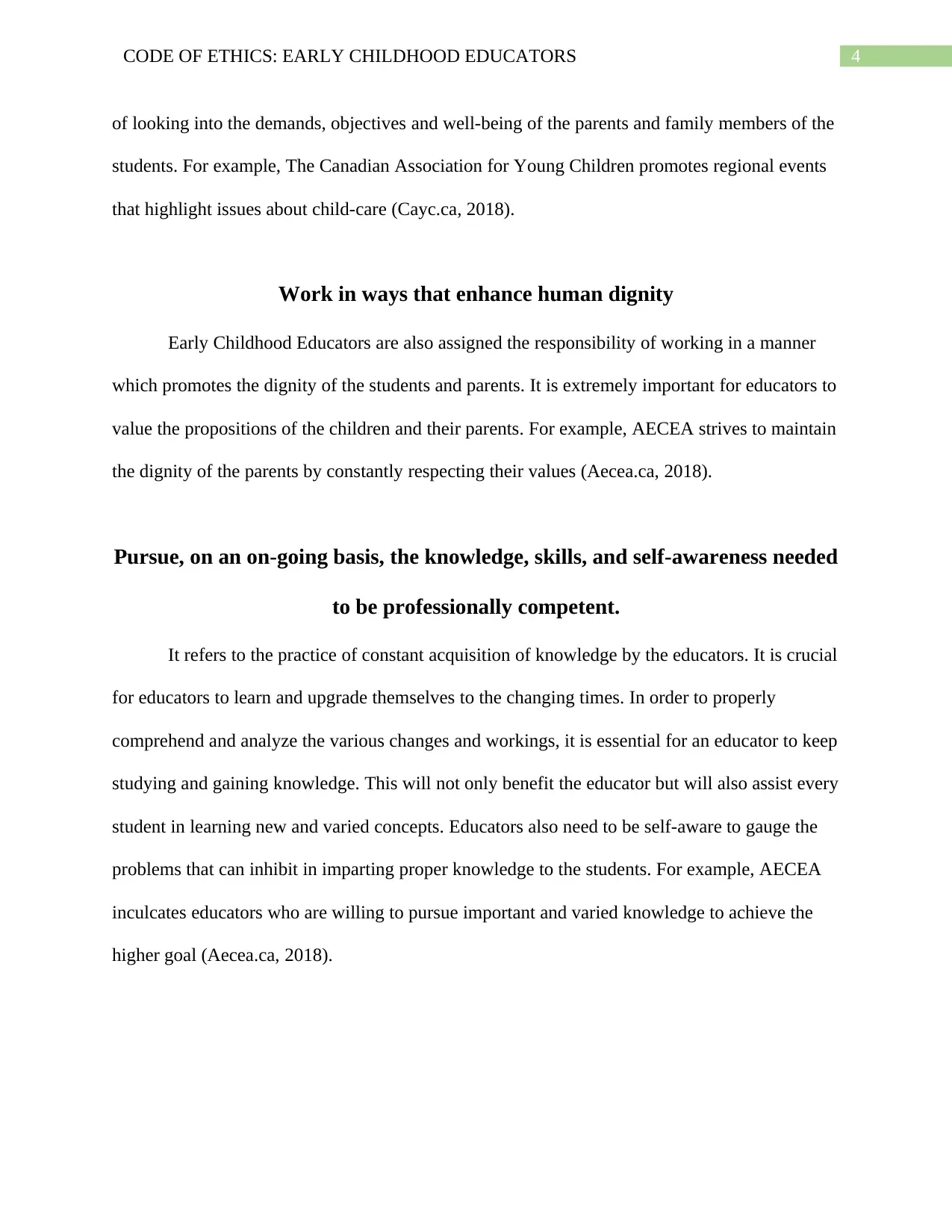
4CODE OF ETHICS: EARLY CHILDHOOD EDUCATORS
of looking into the demands, objectives and well-being of the parents and family members of the
students. For example, The Canadian Association for Young Children promotes regional events
that highlight issues about child-care (Cayc.ca, 2018).
Work in ways that enhance human dignity
Early Childhood Educators are also assigned the responsibility of working in a manner
which promotes the dignity of the students and parents. It is extremely important for educators to
value the propositions of the children and their parents. For example, AECEA strives to maintain
the dignity of the parents by constantly respecting their values (Aecea.ca, 2018).
Pursue, on an on-going basis, the knowledge, skills, and self-awareness needed
to be professionally competent.
It refers to the practice of constant acquisition of knowledge by the educators. It is crucial
for educators to learn and upgrade themselves to the changing times. In order to properly
comprehend and analyze the various changes and workings, it is essential for an educator to keep
studying and gaining knowledge. This will not only benefit the educator but will also assist every
student in learning new and varied concepts. Educators also need to be self-aware to gauge the
problems that can inhibit in imparting proper knowledge to the students. For example, AECEA
inculcates educators who are willing to pursue important and varied knowledge to achieve the
higher goal (Aecea.ca, 2018).
of looking into the demands, objectives and well-being of the parents and family members of the
students. For example, The Canadian Association for Young Children promotes regional events
that highlight issues about child-care (Cayc.ca, 2018).
Work in ways that enhance human dignity
Early Childhood Educators are also assigned the responsibility of working in a manner
which promotes the dignity of the students and parents. It is extremely important for educators to
value the propositions of the children and their parents. For example, AECEA strives to maintain
the dignity of the parents by constantly respecting their values (Aecea.ca, 2018).
Pursue, on an on-going basis, the knowledge, skills, and self-awareness needed
to be professionally competent.
It refers to the practice of constant acquisition of knowledge by the educators. It is crucial
for educators to learn and upgrade themselves to the changing times. In order to properly
comprehend and analyze the various changes and workings, it is essential for an educator to keep
studying and gaining knowledge. This will not only benefit the educator but will also assist every
student in learning new and varied concepts. Educators also need to be self-aware to gauge the
problems that can inhibit in imparting proper knowledge to the students. For example, AECEA
inculcates educators who are willing to pursue important and varied knowledge to achieve the
higher goal (Aecea.ca, 2018).
Paraphrase This Document
Need a fresh take? Get an instant paraphrase of this document with our AI Paraphraser
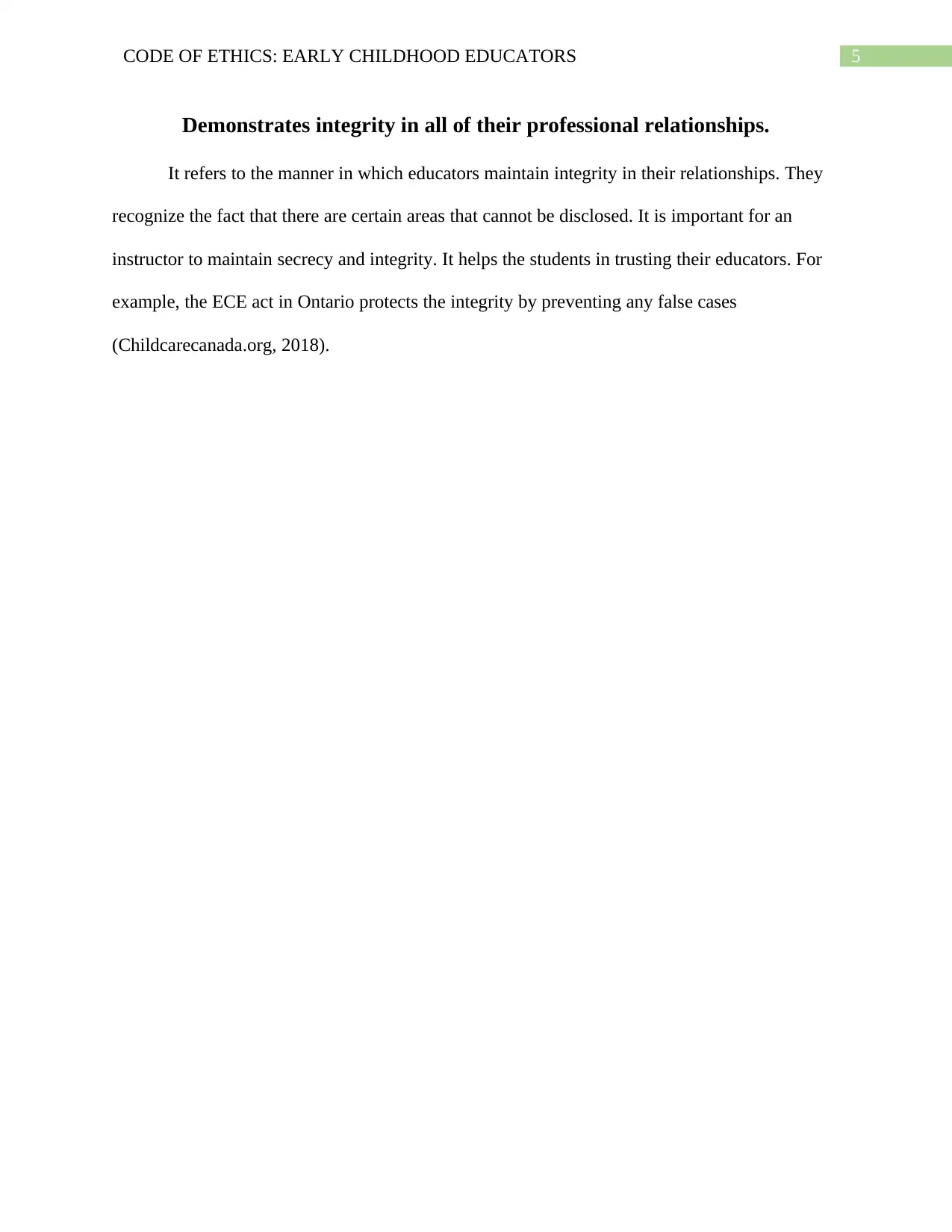
5CODE OF ETHICS: EARLY CHILDHOOD EDUCATORS
Demonstrates integrity in all of their professional relationships.
It refers to the manner in which educators maintain integrity in their relationships. They
recognize the fact that there are certain areas that cannot be disclosed. It is important for an
instructor to maintain secrecy and integrity. It helps the students in trusting their educators. For
example, the ECE act in Ontario protects the integrity by preventing any false cases
(Childcarecanada.org, 2018).
Demonstrates integrity in all of their professional relationships.
It refers to the manner in which educators maintain integrity in their relationships. They
recognize the fact that there are certain areas that cannot be disclosed. It is important for an
instructor to maintain secrecy and integrity. It helps the students in trusting their educators. For
example, the ECE act in Ontario protects the integrity by preventing any false cases
(Childcarecanada.org, 2018).
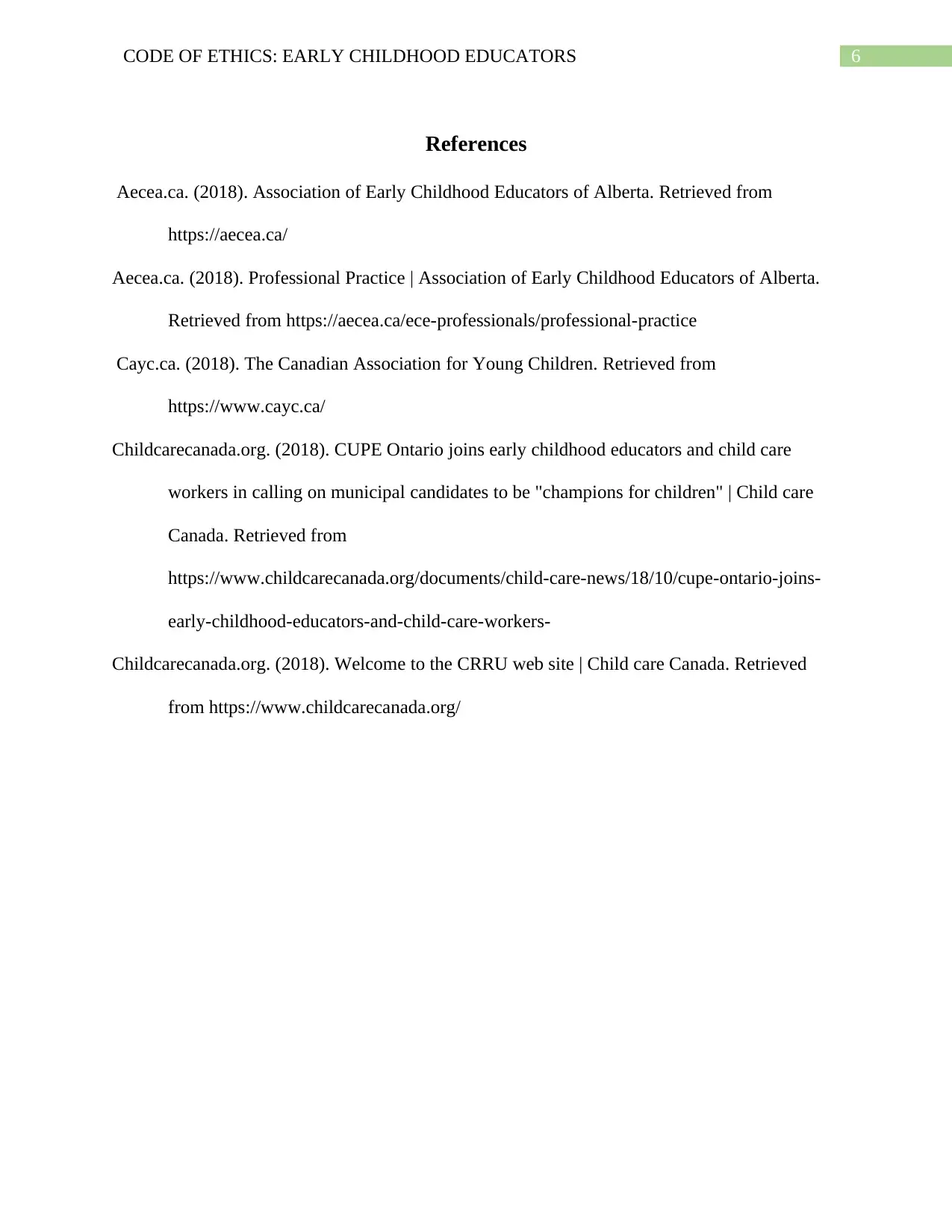
6CODE OF ETHICS: EARLY CHILDHOOD EDUCATORS
References
Aecea.ca. (2018). Association of Early Childhood Educators of Alberta. Retrieved from
https://aecea.ca/
Aecea.ca. (2018). Professional Practice | Association of Early Childhood Educators of Alberta.
Retrieved from https://aecea.ca/ece-professionals/professional-practice
Cayc.ca. (2018). The Canadian Association for Young Children. Retrieved from
https://www.cayc.ca/
Childcarecanada.org. (2018). CUPE Ontario joins early childhood educators and child care
workers in calling on municipal candidates to be "champions for children" | Child care
Canada. Retrieved from
https://www.childcarecanada.org/documents/child-care-news/18/10/cupe-ontario-joins-
early-childhood-educators-and-child-care-workers-
Childcarecanada.org. (2018). Welcome to the CRRU web site | Child care Canada. Retrieved
from https://www.childcarecanada.org/
References
Aecea.ca. (2018). Association of Early Childhood Educators of Alberta. Retrieved from
https://aecea.ca/
Aecea.ca. (2018). Professional Practice | Association of Early Childhood Educators of Alberta.
Retrieved from https://aecea.ca/ece-professionals/professional-practice
Cayc.ca. (2018). The Canadian Association for Young Children. Retrieved from
https://www.cayc.ca/
Childcarecanada.org. (2018). CUPE Ontario joins early childhood educators and child care
workers in calling on municipal candidates to be "champions for children" | Child care
Canada. Retrieved from
https://www.childcarecanada.org/documents/child-care-news/18/10/cupe-ontario-joins-
early-childhood-educators-and-child-care-workers-
Childcarecanada.org. (2018). Welcome to the CRRU web site | Child care Canada. Retrieved
from https://www.childcarecanada.org/
⊘ This is a preview!⊘
Do you want full access?
Subscribe today to unlock all pages.

Trusted by 1+ million students worldwide
1 out of 6
Related Documents
Your All-in-One AI-Powered Toolkit for Academic Success.
+13062052269
info@desklib.com
Available 24*7 on WhatsApp / Email
![[object Object]](/_next/static/media/star-bottom.7253800d.svg)
Unlock your academic potential
Copyright © 2020–2025 A2Z Services. All Rights Reserved. Developed and managed by ZUCOL.




